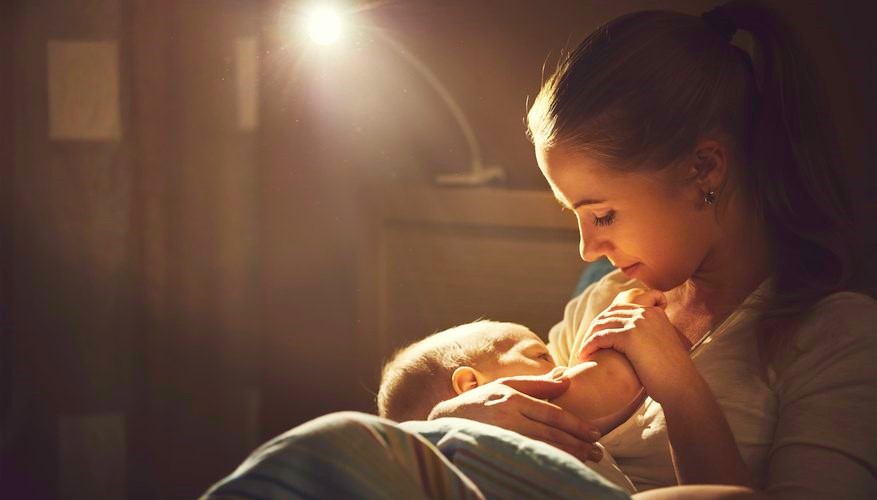Night feeding is a controversial and sensitive subject because it is inextricably linked with sleep. Infant sleep is a complicated subject deep-rooted in a clash between biology and social expectations. There is a great deal of conflicting information around night feeding and sleep behaviour in babies. It is confusing for both parents and healthcare professionals alike! In this blog, I hope to answer some common questions, bust myths and alleviate anxieties. I will also offer some tips on reducing night feeds IF appropriate and IF it’s the right decision for you and your family.
As you read this blog, please remember no two children are the same. Therefore, there cannot be an absolute in parenting. This blog discusses generalised baby behaviour from the research cited!


Question – Why do babies wake at night?
Night-time waking is normal biological behaviour, for both adults and babies. Night-time sleep needs are individualised and variable each night (1). Adults and babies wake up overnight for many reasons (2,12) including hunger, thirst, heat, cold, lights, noise, sleep cycle, dreams, thoughts, wet, dirty, pain, fear, discomfort. I could go on!
Adults might not remember or realise they wake up and fall straight back to sleep. However, babies may need support to fall back to sleep. There are massive social misconceptions about baby sleep behaviour. This can misguide parental expectations increasing feelings of low self-worth and anxiety in parents (3).
Babies wake at night as a biological protective arousal factor (4). When babies are born they are biologically immature. Arousing from sleep leads to increased oxygen levels (4) which is a biological protective factor. Waking up is a baby’s best defence against a range of potential physiological challenges. Night waking is not always for food but also for comfort and emotional reassurance.
Night waking is often determined and regulated by changing growth, metabolic, developmental and calorie requirements, and likely by the baby’s own personality characteristics (4,14). It therefore changes frequently (14).


Question – Do babies need to feed at night?
It is essential that very young babies feed during the night (5). When babies are born, they have small stomachs and need frequent feeds around the clock to ensure healthy growth and development (6). A rough recommendation for a new-born baby is around 8-12 feeds in 24hours (6). As babies grow, the amount and frequency they feed at night is completely individualised.
In the first few months of life, babies sleep and feed sporadically throughout the day and night. This is due to the immaturity of their body clock and biological need for frequent feeding. At around 10-12 weeks of age, the circadian rhythm known as the body clock matures and melatonin (the sleep-inducing hormone) is released (7,13). At this point, babies might sleep for longer at night and at more predictable times during the day (11). Research shows babies under six months regulate their appetite over a 24hr period, therefore night waking for feeds is still very common (8) even with the introduction of melatonin.
Some paediatric sleep texts suggest night feeding isn’t necessary after six months (9) leading many to believe that night waking for feeding is not commonplace. However, research shows that 70 – 80% of infants of 6-18 months will wake between 1 and 3 times at night, mostly to feed (8,10). These studies conclude it is common for babies to still wake at night to feed after 6 months of age. Some babies may sleep through the night after 6 months too, and this is perfectly normal too.
Question – If I reduce night feeding will my baby wake less?
Waking less at night or not waking at all is an eagerly awaited time for many parents, with the idea of sleeping through the night to be the gold standard. Because of this, modifying night feeds is used as a strategy to improve babies sleep (2). However, night feeding is a multifaceted matter, integrated with both sleep and development.
There are many reasons why babies, like adults, wake in the night (12). Research shows reducing night feeding doesn’t necessarily reduce the frequency of night waking and therefore cannot be used as an effective strategy to improve sleep (8). I recommend a holistic health assessment of sleep, feeding and development (after six months of age) before making any radical changes to their night feeding habits. Please get in touch with your health visitor for support and growth assessment.
Question – If I introduce formula will my baby wake less?
It is a common belief that introducing formula at night will help babies to sleep ‘through the night’. Formula-fed babies might sleep for more periods of consolidated sleep, as breast milk is quicker and easier to digest (8). However, new-born formula-fed babies still need to feed at night to ensure healthy growth and development. As day feeding increases in volume, night feeds may decrease. However, this doesn’t necessarily mean night waking will reduce. Research suggests there is no difference in night waking and feeding methods (8). Some parents may decide to mix feed formula and breastmilk to try and help sleep but again, research concludes this makes no difference to the frequency in infant night feeding (8).
If I introduce solid food early will my baby wake less?
Early introduction of solid foods is not recommended. Many health advisories recommend introducing solids around six months with exclusive breast or first milk formula to be offered prior. These advisories include The World Health Organisation, UNICEF, NHS, Royal College of Paediatrics, British Dietetic Association and The Scientific Advisory Committee on Nutrition. The early introduction of solid foods is not recommended and some research concludes it makes no difference to night waking or sleep habits (8,13).
How do I reduce night feeding? IF you want/need to….
As research has found 70% -80% of children up to 18 months will wake 1-3 times per night to feed (8,10) please remember it is common for children to wake for feeding overnight. There is no absolute in parenting. Each family is different. Some parents are happy to continue responsively feeding their children, both day and night. Whilst for others frequent night feeding affects their health and wellbeing.
This section is for parents whose baby is older than six months and who might be feeding very frequently at night – more than every two hours (2). If this frequency is affecting your health and wellbeing and becoming overwhelming, please contact your health visitor and GP so they can support you. Your health visitor can complete a child health assessment to ensure there is no underlying health issue.
It is not advisable to make any radical changes to a baby’s night routine when they are ill or teething. Radical changes at this time can cause babies and parents extra distress.
Before dropping night feeds, try to consider whether other factors are contributing to night waking (remembering it is human behaviour to wake at night)
- Check environmental factors – room temperature, light, noise, clothing etc
- Consider pain as a cause, particularly teething
- Development milestones – are they eating more because they are growing?
Reduce night feeding tips;
- Introduce a variety of other sleep associations when falling asleep. Therefore, not solely relying on feeding to sleep.
- Offer comfort – attempt to settle with cuddles, comfort and love. Potentially rocking or shushing back to sleep.
- Shorten feeds, reduce the volume or cut down on feeds. Cut down one night feed at a time, slowly and gently.
- Ask partners or family members for support.
- Seek professional advice and support if you need it.


In summary
- It is very common for babies to wake up two – three times per night to feed up to 18 months.
- You do not have to reduce night feeds – if you are happy and content then no change needed.
- If frequent feeding (more than every two hours) over night after six months is affecting your physical or mental wellbeing please reach out to your health visiting team for an assessment.


I hope this blog has alleviated some anxieties around night feeding. If you are struggling with any of the points covered please contact your local health visiting team for support or you can contact me for a consultation charlie@thehealthychildco.com
Written by Charlie Blyth, Specialist Public Health Nurse (Health Visitor) and founder of The Healthy Child co. You can follow @thehealthychildco for more tips, advice and support or visit www.thehealthychildco.com for health and parenting courses and workshops.
- Cummington, D. and Junge. M. 2019. SLEEP TALK: EPISODE 40 – WHAT IS NORMAL SLEEP? Sleep Hub [online], [Available: https://sleephub.com.au/podcast-40/ ]
- Hookway, L., 2020. Let’s talk about your family’s sleep. United Kingdom: Pinter & Martin Ltd.
- Harwood, K., McLean, N., Durkin, K. (2007). First-time mothers’ expectations of parenthood: What happens when optimistic expectations are not matched by later experiences? Developmental Psychology, 43(1), 1–12. [Available https://doi.org/10.1037/0012-1649.43.1.1]
- McKenna, J., (2014). Night waking among breastfeeding mothers and infants: Conflict, congruence or both? Evolution, Medicine, and Public Health [online]. 2014, (1), 40- 47. [Available https://doi.org/10.1093/emph/eou006]
- UNICEF, 2019. Caring for your baby at night, a guide for parents. [Available https://www.unicef.org.uk/babyfriendly/baby-friendly-resources/sleep-and-night-time-resources/caring-for-your-baby-at-night/ ]
- NHS England. 2019. NHS ENGLAND. [Viewed 26 February 2021]. [Available https://www.nhs.uk/conditions/baby/breastfeeding-and-bottle-feeding/breastfeeding/the-first-few-days/ ]
- Glotzbach, S., Edgar, D., Boeddiker, M., Ariagno, R., (1994) Biological Rhythmicity in Normal infants During the First 3 Months of Life. Paediatrics [online] 94(4) 482-488.
- Brown, A. and Harries, V. (2015). Infant sleep and night feeding patterns during later infancy: association with breastfeeding frequency, daytime complementary food intake, and infant weight. Breastfeeding Medicine. 10(5):246-52. [Available doi: 10.1089/bfm.2014.0153].
- Mindell, J.A and Owen, J.A. (2015). A Clinical guide to paediatric sleep: diagnosis and management of sleep problems. 3RD Philadelphia: Lippincott Williams & Wilkins.
- Hysing, M., Harvey, A.G., Torgersen, L., Ystrom, E., Reichborn-Kjennerud, T., Sivertsen, B., (2014). Trajectories and predictors of nocturnal awakenings and sleep duration in infants. Journal of Developmental and Behavioural Paediatrics [online]. 35(5):309-16. [Available doi: 10.1097/DBP.0000000000000064. PMID: 24906032].
- Bruni, O., Baumgartner, E., Sette, S., Ancona, M., Caso, G., Di Cosimo, M.E., Mannini, A., Ometto, M., Pasquini, A., Ulliana, A., Ferri, R. (2014) Longitudinal study of sleep behaviour in normal infants during the first year of life. Journal Clinical Sleep Medicine [online] 10: 1119–1127.
- Adams, S.M., Jones D.R., Esmail, A., Mitchell, E.A., (2004). What affects the age of first sleeping through the night? Journal of Paediatrics and Child Health [online]. 40(3):96-101. [Available doi: 10.1111/j.1440-1754.2004.00317.x. PMID: 15009572.]
- Nevarez, M. D., Rifas-Shiman, S. L., Kleinman, K. P., Gillman, M. W., & Taveras, E. M. (2010). Associations of early life risk factors with infant sleep duration. Academic paediatrics, 10(3), 187–193. https://doi.org/10.1016/j.acap.2010.01.007
- Pennestri, M.H., Burdayron, R., Kenny, S., Béliveau, M.J., Dubois-Comtois, K., (2020). Sleeping through the night or through the nights? Sleep Medicine [online]. 76, 98-103. [Available: https://doi.org/10.1016/j.sleep.2020.10.005 ]